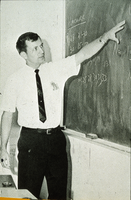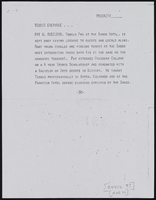Search the Special Collections and Archives Portal
Search Results

Pablo Macias oral history interview: transcript
Date
Archival Collection
Description
Oral history interview with Pablo Macias conducted by Elsa Lopez, Monserrath Hernandez, and Claytee D. White on December 07, 2019 for the Latinx Voices of Southern Nevada Oral History Project. Pablo Macias was rasied in the small town of Carlin outside of Elko, Nevada. His father and mother met in Ogden, Utah where his father was working on railroad in Nevada and Utah. After finishing high school, he got a job at Elko Blacksmith Shop, where he learned to weld. After attending Northern Nevada Community College, he enrolled and graduated from UNR. After graduation, he took a position at Von Tobel Middle School in 1990 teaching Spanish and Physical Education. While working as a Spanish teacher in Rancho High School he enrolled in a Master's program at Nova Southeastern University, completing the program in education administration. He currently serves as the Associate Director of Corporate Work Study Program Operations for Cristo Rey St. Viator College Preparatory High School. Subjects discussed include: Education, Rancho High School, Von Tobel Middle School, Barrick Mining, and Cristo Rey.
Text

Slide of Stanley Grenda, University of Nevada, Las Vegas, circa 1968
Date
Archival Collection
Description
Image

Transcript of interview with Barbara Agonia by Suzanne Becker, September 17, 2007, September 25, 2010, & October 2, 2007
Date
Archival Collection
Description
When Barbara Agonia arrived in Las Vegas in 1969 to pursue a Master's Degree in English, the University of Nevada Las Vegas was barely ten years old and the population of Las Vegas was just approaching 160,000 residents. At the time, she was 35 years-old and it was a decision and move that would forever change her life and higher education in Clark County. Barbara Agonia was born in St. Louis, Missouri, in 1934 to Robert Lewis Klinefelter and Suzanne Carter Klinefelter. At the time of Barbara's birth, her father worked for Brown Shoe Company in St. Louis. The family moved to Bunker Hill, Illinois when Barbara was still an infant. This was Mr. Klinefelter's hometown where a portion of the extended family still resided. In the late 1930s, Mr. Klinefelter got a job in a brass mill near Alton, Illinois, and he commuted there daily. When the United States entered World War II, Mr. Klinefelter tried to enlist in the army, but was rejected because he had two small children and because he worked in an essential industry. He decided to work in a non-essential industry and took a job at Montgomery Ward in Oak Park, Illinois. Barbara was in the third grade that year. Still unable to enlist, Mr. Klinefelter moved the family to Wabash, Indiana, and began working for General Tire in 1943. They moved to Logansport, Indiana in 1947. Agonia recounts that education has always been a significant part of her life, with the importance of a good education stressed in her life from early childhood forward. After graduating from high school in Logansport, Indiana, she attended Hanover College in southern Indiana, enrolling in 1952. Her educational experience at Hanover included a year studying abroad at the University of Exeter in Devonshire, England—an experience which Agonia credits as further cementing her commitment to education and her love of literature and language. She graduated from Hanover in 1957 with a double major in English and speech/ theater. Agonia spent her first years out of college teaching high school English, speech, and theater in west central Illinois and the next eight in northern Illinois. A little over ten years into her career, at the age of 35, she decided to pursue a Master's degree in English. Her sister, Martha, who at the time lived in Las Vegas, suggested checking into programs offered at the city's newly formed university. In 1969, Barbara moved to Las Vegas and enrolled in the English Department at UNLV. As Agonia was completing her degree in 1971, the community college system in Nevada was emerging and seeking faculty for the up and coming institution. Curious to know more about the new system, Agonia scheduled a meeting with the person in charge of hiring. Two hours later, she walked out with a contract in her hand, one of eight new faculty members at Clark County Community College, now known as College of Southern Nevada. In her early years with the college, Agonia did a great deal of public speaking on behalf on the newly formed system, promoting the new institution and reaching out to potential students. At the same time, she taught full course loads in composition and literature, and eventually became chair of the English department. Her new position and public speaking work on behalf of the college not only provided her contact with the local Las Vegas community, it ultimately became the catalyst in spurring her passion for community involvement, particularly working on behalf of women within the community. • • Vll As the 1980s approached, Agonia became actively involved in rape crisis education, at the urging of Florence McClure. Then, in 1980, Agonia was again in on the ground floor of community programming, when she and Beverly Funk, at the urging of Judith Eaton, the president of Clark County Community College, established a Women's Center on campus. The Center was initially set up to help women in a variety of life circumstances, including women who were wanting to return to school or who were new to the process of school altogether. The center eventually became the Re-Entry Center offering skill development, tutoring programs, and other forms of assistance for anyone interested in returning to school. In addition to her involvement in and commitment to public education, Agonia has also been involved in the Soroptimist International organization for business and professional women who work to improve the lives of women and girls in local and international communities. In the Las Vegas area, Soroptimist International of Greater Las Vegas worked to establish the Rape Crisis Center and the Center for Domestic Violence, which later became SafeNest. Agonia has been working with the organization since 1982. Through Soroptimist International, she also became involved in Friends of the Nevada Wilderness, an organization devoted to designation and long-term protection of Nevada's wilderness areas. As the representative for Soroptimist International, she traveled to Washington to lobby and testify in front of the senate for the establishment of Great Basin National Park. Agonia's work in the Las Vegas community over the past forty years has been significant. She counts Florence McClure, Geneva Douglas, and Jean Ford amongst her greatest influences. As she notes in her oral history, "I learned how to be radical from those women." She happily embraces the label of radical. This attitude surfaces throughout Agonia's experiences and recollections, and underscores her work and dedication to the interplay of local education and women's issues within Nevada.
Text

Meeting minutes for Consolidated Student Senate, University of Nevada, Las Vegas, June 6, 1974
Date
Archival Collection
Description
Text
Monte Bay oral history interview
Identifier
Abstract
Oral history interview with Richard "Monte" Bay conducted by Peter Brown on November 14, 2006 for the Public School Principalship Oral History Project. In this interview, Bay reflects upon his career as a teacher and administrator with the Clark County School District (CCSD) from the 1980s to the time of the interview. Originally from Nevada, he describes his upbringing and pursuit of education, how he became a teacher, and eventually a principal. He discusses his regular job responsibilities and challenges that he faced with school overcrowding. He also describes his approach to leadership, and how his approach changed working at high schools such as Coronado High School.
Archival Collection

Epilogue: UNLV Yearbook, 1969
Date
Description
Yearbook main highlights: schools and departments; detailed lists with names and headshots of faculty, administration and students; variety of photos from activities, festivals, campus life, and buildings; campus organizations such as sororities, fraternities and councils; beauty contest winners; college sports and featured athletes; and printed advertisements of local businesses; Institution name: University of Nevada, Las Vegas
Mixed Content
Arturo F. Ochoa oral history interview
Identifier
Abstract
Oral history interview with Arturo F. Ochoa conducted by Kenneth L. Morrow on October 29, 2006 for the Public School Principalship Oral History Project. In this interview, Ochoa reflects upon his career as a teacher and administrator with Nevada’s Clark County School District (CCSD). He discusses his educational background that led to his becoming a bilingual education teacher, and describes the process by which he eventually became a principal. He discusses his approach to education, programs that he created, and his approach to working relationships with teachers and other administrators.
Archival Collection
Jane McCarthy oral history interview
Identifier
Abstract
Oral history interview with Jane McCarthy conducted by Claytee D. White on November 06, 2006 for the UNLV @ 50 Oral History Project. In this interview, McCarthy discusses her involvement with the University of Nevada, Las Vegas (UNLV) College of Education and their outreach program with the Navajo Nation. She explains that UNLV professors visit the reservation and offer graduate classes to teachers. McCarthy describes the reservation she visited, doing her sabbatical on the reservation in 2002, and the challenges that come with teaching Navajo children. Later, McCarthy recalls how she became involved with the Accelerated Schools Project, starting her career at Stanford University, and the differences between Stanford and UNLV. Lastly, McCarthy talks about the No Child Left Behind Act and the shortage of teachers in the Clark County School District (CCSD).
Archival Collection
#71268: "Please I'd Like to Grow", located on the first floor of Lied Library, highlights student activism at UNLV from its founding up until the present day. The exhibit's title was taken from a photo printed in the 1968 edition of the UNLV student yearbook, Epilogue, of a college student holding a sign that reads "Please I'd Like to Grow", November 30, 2016, 2016 November 30
Level of Description
Archival Collection
Collection Name: University of Nevada, Las Vegas Creative Services Records (2010s)
Box/Folder: Digital File 01
Archival Component

